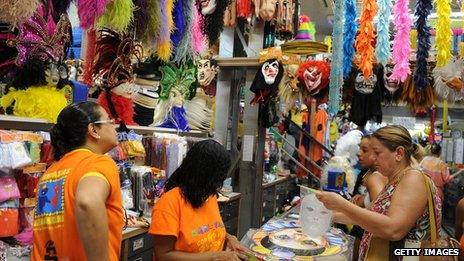Brazil economy slows unexpectedly
- Published

Brazil's economy slowed unexpectedly in the third quarter, new data suggests.
Latin America's biggest country clocked just 0.6% growth in the three months to September versus the previous quarter, half the rate expected by analysts.
Businesses cut their investment by a further 2%, while consumer spending growth was a sluggish 0.9%.
The weak private-sector spending counteracted a big round of stimulus spending unleashed by the government, including tax cuts for businesses.
"It was horrible," said Jankiel Santos, chief economist at BES Investimento in Sao Paulo. "The government is certainly going to be worried about this. The expectation is that they are going to come out with more stimulus measures."
In September, the government cut its growth forecast for the year to 2% - a figure that was still seen as too optimistic by markets even before the latest data release.
Growth for 2012 now looks set to be closer to 1%, compared with 2.7% last year and 7.5% in 2010.
President Dilma Rousseff launched the first in a series of measures aimed at injecting up to $50bn (£32bn) into the economy over the next five years, and increasing the private sector's role in the economy.
The plan included privatising about 14,000km of railways and roads, followed by selling ports and lowering energy costs.
Expensive energy, poor infrastructure and increasing labour costs - known as "Custo Brasil" or the "Brazil Cost" - have weighed on growth, analysts say.
Despite the move, the latest data suggests that Brazilian companies remain unconfident about business prospects.
- Published26 November 2012
- Published8 November 2012
- Published2 October 2012
- Published13 September 2012